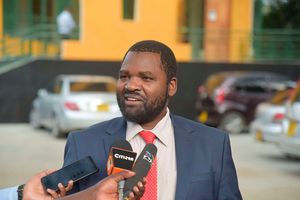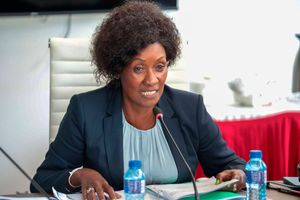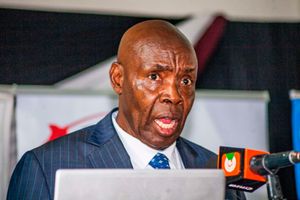
High school students walk home for the mid-term break on February 29. Some schools have rationed food or knocked items from their menus.
Delayed government funding threatens to cripple basic and higher education countrywide, school managers and teachers unions now say.
The Saturday Nation has established that some schools may close earlier than the official April 5, 2024 date as they have no money. Some are unable to prepare end-of-term tests. They have explored other options like continuous assessment tests as they cannot afford to print full papers.
A number of boarding schools have rationed food or knocked some items off their menus.
The situation is complicated by the fact that secondary schools have not received any money for Form Ones since their data was not in the National Education Management System by the time the funds were disbursed.
Also Read: The sham that is Kenya's free education
School heads and teachers’ unions are demanding the release of First Term money in full.
At the same time, universities have not received money meant for student tuition, a situation that has made the National Assembly Education Committee to question the sustainability of the funding model introduced last year.
Education hogged the lion’s share of this year’s national budget at Sh628.6 billion, translating to 27.4 per cent. However, the government has been struggling to send money to learning institutions.
Kenya Secondary Schools Heads Association (Kessha) chairman, Willy Kuria, says schools have only received Sh3,877 per learner, contrary to the Sh8,319 indicated in a circular by Basic Education Principal Secretary Belio Kipsang.
“Because students are in school, Kenyans assume that all is well. It is not,” Mr Kuria said.
He added that the government pledged to settle the balance “soon”.
A January 25, 2024 message by Director of Secondary Education at the Ministry of Education, Paul Kibet, to heads reads:
“I would like to update you on the Free Day Secondary Education (FDSE) disbursements. The circular released specifies the amount to be disbursed in two equal tranches. This will be the 50 per cent for Term One.”
“I am pleased to inform you that the first tranche has been disbursed. For clarity, the amount received is for the tranche one. The second and final tranche for Term One is in progress and will be disbursed shortly”.
Mr Kibet told the Saturday Nation that it only Dr Kipsang is authorised to speak on the issue.
The PS had, however, had not responded to our queries by the time of going to press.
Kenya Union of Post Primary Education Teachers (Kuppet) Secretary-General, Akello Misori, accuses the government of a “casual attitude” towards funding education.
He said day schools are most affected as they rely entirely on FDSE.
A learner is entitled to Sh22,244 annually but the amount has fallen to about Sh17,000.
Students in boarding schools are funded at the same rate, with parents paying for the cost of boarding, depending on the category of an institution.
By government estimates, day schools account for about 70 per cent of learners in secondary school.
Mr Misori said most learners in day schools are from poor backgrounds and that failure to facilitate their being in school disadvantages them more.
“It’s not fair to our students. There are debts in schools arising from last year which have to be cleared. Suppliers don’t want to deal with schools. When they do, they inflate prices to cover for the delay in payments,” he said.
The unionist added that learning of some subjects, especially the sciences, has been affected by inability by schools to buy laboratory equipment and chemicals. He said laboratory assistants have not been paid for long.
According to the Kuppet chief, some schools cannot take part in co-curricular activities.
Apart from government funding, Mr Kuria said parents owe schools billions of shillings yet the government prohibits principals from sending students home for money.
“We can’t tell them to go home but why keep them in school to starve?” the Kessha boss asked.
Education Cabinet Secretary Ezekiel Machogu and Higher Education PS Beatrice Inyangala did not responded to our text messages and phone calls.
Last week, Universities Fund (UF) Chief Executive Geoffrey Monari told the National Assembly Education Committee that the agency needs Sh11.9 billion from the Exchequer for First-Year students after receiving Sh7.97 billion.
He added that public universities had been informed that the funds would be disbursed immediately they are received by the agency.
It has also emerged that continuing government-sponsored students in private universities are dropping out or deferring studies as the institutions have not received the tuition fee. Mr Monari said private universities have only received 10 per cent of the expected amounts.
However, students have received their money for upkeep from the Higher Education Loans Board (Helb).
The delays raise doubts over the sustainability of the model, considering that more students are expected to join university this year as the old differentiated unit cost model is phased out.
National Assembly Education Committee Chairman Julius Melly instructed Dr Inyangala to prepare a brief on the sustainability of the model as student numbers rise.
More than 200,000 Kenya Certificate of Secondary Education examination candidates qualified for university admission in 2023, putting a strain on the state to spend more money on their education.
The number the previous year was 173,000.
Meanwhile, student leaders from Kenyatta University plan to present a petition to Helb and the Ministry of Education to demand more accountability on how learners are allocated scholarships and loans.
One of the representatives, Zadock Nyakwaka, said the new funding model has made students accrue many debts.












